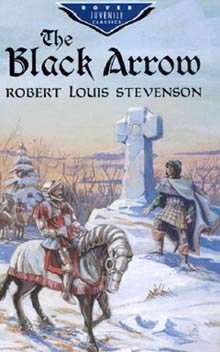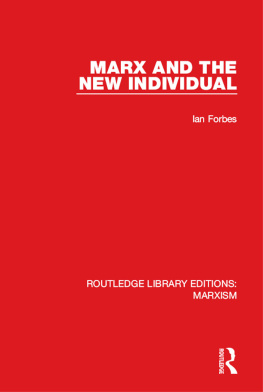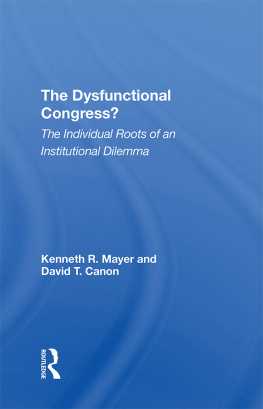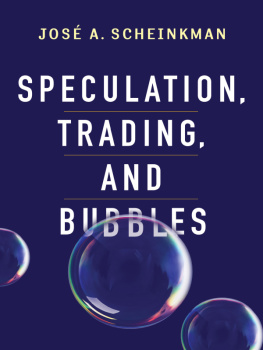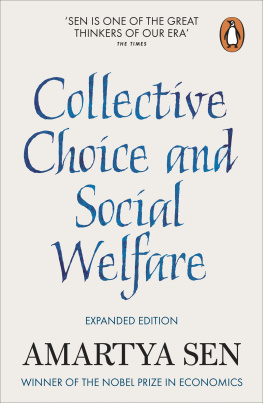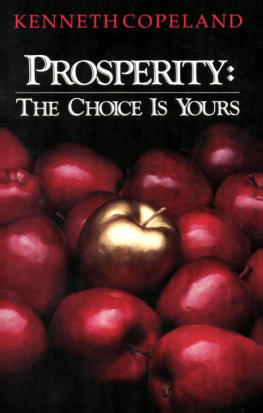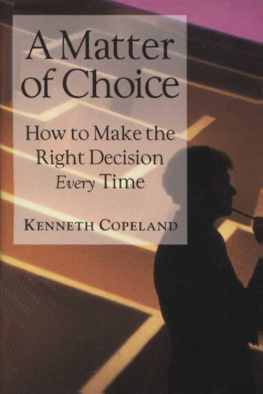Kenneth J. Arrow - Social Choice and Individual Values
Here you can read online Kenneth J. Arrow - Social Choice and Individual Values full text of the book (entire story) in english for free. Download pdf and epub, get meaning, cover and reviews about this ebook. year: 2012, publisher: Yale University Press, genre: Politics. Description of the work, (preface) as well as reviews are available. Best literature library LitArk.com created for fans of good reading and offers a wide selection of genres:
Romance novel
Science fiction
Adventure
Detective
Science
History
Home and family
Prose
Art
Politics
Computer
Non-fiction
Religion
Business
Children
Humor
Choose a favorite category and find really read worthwhile books. Enjoy immersion in the world of imagination, feel the emotions of the characters or learn something new for yourself, make an fascinating discovery.

- Book:Social Choice and Individual Values
- Author:
- Publisher:Yale University Press
- Genre:
- Year:2012
- Rating:3 / 5
- Favourites:Add to favourites
- Your mark:
- 60
- 1
- 2
- 3
- 4
- 5
Social Choice and Individual Values: summary, description and annotation
We offer to read an annotation, description, summary or preface (depends on what the author of the book "Social Choice and Individual Values" wrote himself). If you haven't found the necessary information about the book — write in the comments, we will try to find it.
Social Choice and Individual Values — read online for free the complete book (whole text) full work
Below is the text of the book, divided by pages. System saving the place of the last page read, allows you to conveniently read the book "Social Choice and Individual Values" online for free, without having to search again every time where you left off. Put a bookmark, and you can go to the page where you finished reading at any time.
Font size:
Interval:
Bookmark:
COWLES FOUNDATION
for Research in Economics at Yale University
Monograph 12
For Research in Economics at Yale University
The Cowles Foundation for Research in Economics at Yale University, established as an activity of the Department of Economics in 1955, has as its purpose the conduct and encouragement of research in economics and related social sciences with particular emphasis on the development and application of logical, mathematical, and statistical methods of analysis. The professional research staff have, as a rule, a departmental appointment and some teaching responsibility.
The Cowles Foundation continues the work of the Cowles Commission for Research in Economics founded in 1932 by Alfred Cowles at Colorado Springs, Colorado. The Commission moved to Chicago in 1939 and was affiliated with the University of Chicago until 1955. In 1955 the professional research staff of the Commission accepted appointments at Yale and, along with other members of the Yale Department of Economics, formed the research staff of the newly established Cowles Foundation.
A list of Cowles Foundation Monographs appears at the end of this volume.
THIRD EDITION
Kenneth J. Arrow
Foreword by Eric S. Maskin

Copyright 1951, 1963, 2012 by Cowles Foundation for Research in Economics at Yale University. Originally published by John Wiley & Sons, Inc.
All rights reserved. This book may not be reproduced, in whole or in part, including illustrations, in any form (beyond that copying permitted by Sections 107 and 108 of the U.S. Copyright Law and except by reviewers for the public press), without written permission from the publishers.
Yale University Press books may be purchased in quantity for educational, business, or promotional use. For information, please e-mail sales.press@ yale.edu (U.S. office) or sales@yaleup.co.uk (U.K. office).
Printed in the United States of America.
Library of Congress Control Number: 2011945943 ISBN 978-0-300-17931-6 (pbk.)
A catalogue record for this book is available from the British Library.
10 9 8 7 6 5 4 3 2 1
Eric S. Maskin
Kenneth Arrow is a towering figure in economics and the social sciences more generally. And so I felt extraordinarily honored when Yale University Press asked me to write a foreword to a new edition of his landmark monograph Social Choice and Individual Values. Ken also happens to be my former teacher and a mentor and role modelfacts that made the invitation a great personal pleasure as well, and an excuse for some nostalgia.
I first met Ken when I was an undergraduate at Harvard in the early 1970s. I was a math major but somehow wandered into his graduate course on information economics. It was a hodgepodge of some of the cutting-edge topics he was thinking about thene.g., mechanism design, adverse selection, and communication in organizationsand proved to be utterly fascinating. I cant say that Kendespite his interest in the theory of organizationswas the most organized of teachers. His lectures sounded improvised, largely because they were: he apparently decided what to talk about on his way over to the classroom (and sometimes not even then). On one unusual occasion, he prepared a lecture in advanceon a highly technical result called the Gibbard-Satterthwaite theorem (not yet published at the time)but then forgot to bring his notes. He worked out a new and detailed proof of the theorem for us on the spot.
One feature that made the course so gripping was Kens ability to pack so much into so little time. This was partly because he talks unusually fast. But even Kens rapid-fire speaking style couldnt keep pace with his lightning-quick mind. So his presentations had an elliptical qualityhe would leave out the ends of sentences so that he could race ahead to the next thought. His listeners would have to stay alert to fill in the missing words.
Another thing that struck us students was the breadth of Kens knowledge, which extended far beyond economics. He would be lecturing on some technical point when an apt quotation from Maimonides or an analogy from thermodynamics would occur to him. Ken evidently knew more on virtually any subject than any of the rest of us. There was a story at Harvard that a group of junior faculty once concocted a plan by which they could finally appear to outshine their erudite senior colleague. They read up on the most arcane topic they could think of: the breeding habits of gray whales. On the appointed day they gathered in the coffee room and waited for Ken to come in. Then they started talking about the elaborate theory of a marine biologist named Turner on how gray whales find their way back to the same breeding spot year after year. Ken was silent... they had him at last! With a delicious sense of triumph, they continued to discuss Turner, while Ken looked increasingly perplexed. Finally, he couldnt hold back: But I thought Turners theory was discredited by Spenser, who showed that the supposed homing mechanism couldnt possibly work.
With its publication in 1951, Social Choice and Individual Values initiated the modern theory of social choice, the study of how a society should choose among its various options based on the preferences of the individual members of society. There had been sporadic literature on the subject before Arrow, going back (at least) to Jean-Charles Borda and the Marquis de Condorcet in the late eighteenth century. But the earlier essays lacked the generality and power of Arrows approach, and the subject did not really take off until Social Choice. But take off it did: by the time the second edition was published, in 1963, there were already several hundred works building on the book. A recent count on Google Scholar turned up over ten thousand citations.
Let me try to explain why the monograph has turned out to be so immensely influentialof interest to political scientists, sociologists, lawyers, and philosophers as well as economists. First, Arrows abstract formulation of the social choice problem makes it very widely applicable. He begins with a society and a set of social alternatives (the different possible options from which society must choose), which, depending on the context, could be almost anything. For example, in a setting where a town is considering whether or not to build a bridge across the local river, society comprises the citizens of the town, and the social alternative set consists of just two options: build the bridge or dont build it. In a context of pure distribution where there is a jug of milk and a plate of cookies to be divided among a group of children, the children are the society, and the social alternative set consists of the different ways the milk and cookies could be allocated to them. In a setting where a committee is interested in electing a chairman, society is the committee, and the social alternatives are the various candidates for the chairmanship.
Arrows definition of a social welfare function (SWF) is also very general. An SWF is any rule for determining societys preferences over the social alternative set on the basis of the preferences of the individual members. More precisely, because individuals preferences might not be known in advance, the SWF is a function: it must determine social preferences for every different configuration of preferences that individuals could have, i.e., for every profile of possible preferences.
The most famous example of an SWF is probably majority rule,
Next pageFont size:
Interval:
Bookmark:
Similar books «Social Choice and Individual Values»
Look at similar books to Social Choice and Individual Values. We have selected literature similar in name and meaning in the hope of providing readers with more options to find new, interesting, not yet read works.
Discussion, reviews of the book Social Choice and Individual Values and just readers' own opinions. Leave your comments, write what you think about the work, its meaning or the main characters. Specify what exactly you liked and what you didn't like, and why you think so.

